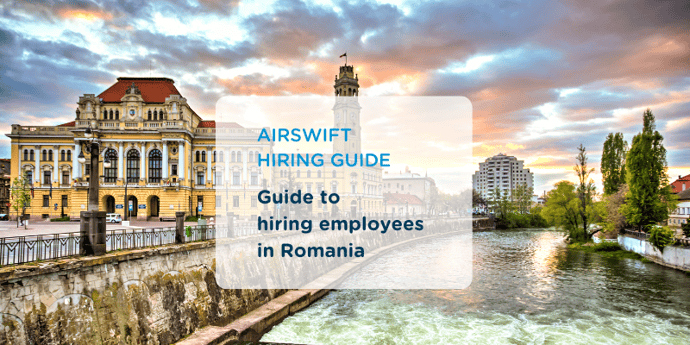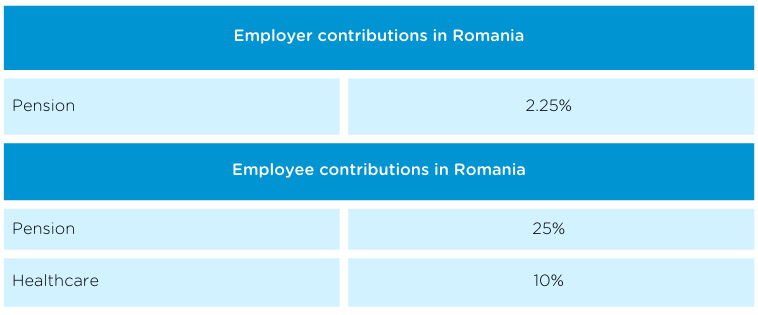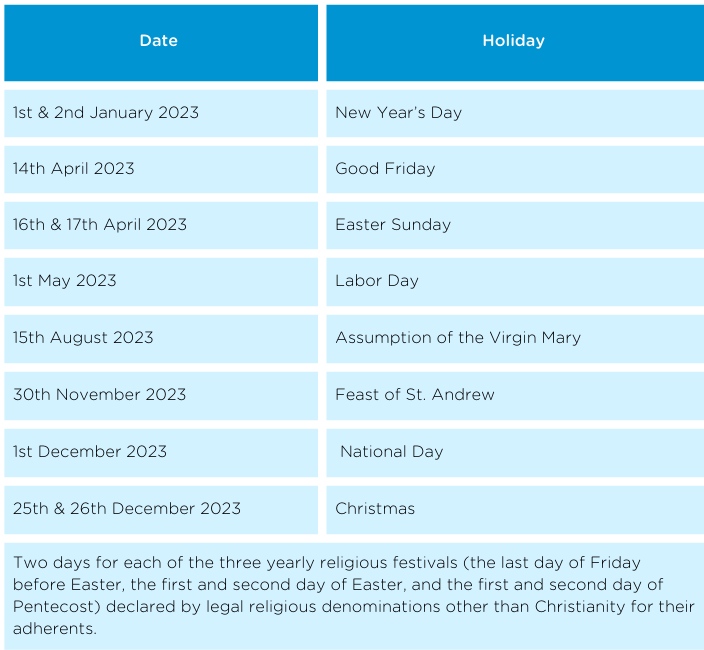
By
Leanna Seah
September 20, 2024
Updated
October 29, 2024

Overview
Romania is a country in the Balkans with one of the most diverse European populations and a rich cultural heritage. It has a well-developed education system that ranks 15th among European nations in terms of quality according to the World Economic Forum's Global Competitiveness Report 2017-2018; many universities offer courses in English. As a result of its excellent education system, Romania has become one of the most attractive countries for outsourcing due to its high number of highly skilled professionals who can be hired at competitive rates.
Romania is a great place to do business with its thriving economy. There are no restrictions on hiring foreign nationals in Romania, so you can hire employees from all over Europe without special permissions or visas. Some of the top industries in Romania include the automobile industry, petrochemicals, cement and construction, aircraft, textiles, food and beverages, mining, consumer durables, tourism, and the metallurgical industry.
| Capital | Bucharest |
| Languages spoken | Official: Romanian Others: Hungarian, Romani, Ukrainian, German, Greek, Russian, Turkish, Tatar, Serbian, Slovak, Bulgarian, Croatian Foreign: English, French, German, Italian |
| Population size | 18.93 million as of December 4, 2022 |
| Payroll frequency | Monthly |
| Currency | Romanian leu/lei(pl.) (RON) |
| VAT | 19% |
Payroll and taxes
Romanian employment law is comprehensive and looks out for employer and employee wellbeing. There are mandated pensions, healthcare, and unemployment systems in Romania that apply to all employees and employers. Employees must make compulsory contributions to each of these schemes. The employer makes a single payment.
 Table 1: Types of mandatory contributions from employers/employees
Table 1: Types of mandatory contributions from employers/employees
Working hours
Regular working hours
Working hours are any period during which an individual works, is accessible to the firm, and accomplishes his obligations and responsibilities as stipulated by the particular employment contract, any collective labour agreements, and national labour regulations.
Regular working hours are eight hours per day, 40 hours per week. The standard workweek is five days. Specific jobs may construct a daily working schedule of less than or higher than eight hours by collective or individual bargaining. Choosing an uneven distribution of working hours for specific job scopes is permissible. Still, the typical duration of working time in a workweek in such situations must be at most 40 hours.
Irregular working hours
Within the 40-hour working week, collective labour agreements or internal laws can arrange an unequal work schedule. An irregular work schedule may be implemented if stated in the individual employment contract. Normal and overtime pay rates apply.
Flexible working hours
The employer may establish such an arrangement with the employee. This is a flexible way of organising working hours. The daily working time is divided into two parts -
- A predetermined period in which the employee is both at work and;
- A variable/mobile period in which the employee chooses their arrival and departure timings with the daily working hours in mind.
Working hours, including overtime, may be increased above 48 hours per week if the number of work hours averaged over four months does not exceed 48 hours per week.
For temporary flexible work schedules, employers can establish them at the request or approval of employees. If the employer denies the employee's request for a quick customised work schedule, the company must tell the employee within five working days of receiving the request.
Normal and overtime pay rates apply.
Shift hours
Shift work is organising the work schedule according to a defined plan that can be continuous or discontinuous. The employee will carry out their tasks at different time intervals in a daily or weekly period, as determined by their employment contract. Normal and overtime pay rates apply.
Overtime hours
Overtime is any hours worked more than the contracted 8 hours per day or 40 hours per week. No more than 8 hours of overtime each week is permitted. Unless there are unforeseen events or urgent efforts meant to prevent or eliminate the consequences of an accident, employees may not perform overtime without the employee's consent. Over four months, the maximum average weekly working hours (including overtime) cannot exceed 48 hours (8 hours overtime per week). People under the age of 18 may not perform overtime hours.
Overtime can be repaid by time off equivalent to overtime hours, paid within 90 calendar days after job completion. If employees cannot obtain paid time off compensation within the following 90 calendar days, the overtime payment must be agreed upon and cannot be less than 75% of the base pay rate.
Night hours
Night shift workers work night shifts and perform at least 3 hours of night work every day or at least 30% of their total monthly hours at night. The duration of a night shift cannot exceed 8 hours, determined over three months. Any hours above this are subject to overtime compensation.
Night shift employees are entitled to a one-hour reduction in regular working hours without a wage reduction or a 25% bonus pay.

Source: Shutterstock
Minimum wage
All Romanian employees are entitled to be paid the minimum wage by their employees. Minimum wages vary depending on the industry, but as of January 2022, it was set at 2550 RON per month (about $544). The gross minimum salary for construction workers will stay the same as in 2021, at 3.000 RON (about $640).
Employee benefits
In addition to the basic salary and applicable bonuses/commissions, some of the mandated benefits for Romanian employees provided by employers/Social Services are as follows:
- Pension
- Public system healthcare
- Paid time off
- Sick days/ short-term disability benefit
- Birthing/parental leaves
- Other leaves as stipulated by law and contracts
- Workers' compensation/work accidents/professional diseases
- Child allowance
- Voluntary pension scheme
- Private Medical Insurance
- Business Travel Insurance
- Group Life and Disability Insurance
- Permanent total or partial disability (illness, accidents)
- Indemnity for critical illness
- Daily cash benefit for temporary disability (days of hospitalisation and ambulatory plus days of
- convalescence)
- Daily cash benefits for medical expenses up to different sub-limits
- Indemnity for surgical intervention expenses up to different sub-limits
- Indemnity for broken bones (following accidents)
- Indemnity for burns (following accidents)
Other supplementary benefits that employers can give to employees as additional perks can include:
- Meal vouchers
- Performance bonus, holiday bonus
- Gym membership
- Work-from-home or flexible hours programs
- Transportation benefits – company bus, public transport allowances, bike allowances, fuel allowance, parking space, etc.
- Workplace canteens
- Professional training and certification programs, participation in conferences and seminars
- Company car – typically for sales positions, management positions, executives
- Mobile phones and calls covered entirely by the employer
- Company laptop
- Increased annual leave days
- Discounts on company products, if applicable
- Less common perks include:
- Flex benefits
- Relocation allowances, rent – usually top management only
- Savings plan or financial wellness
- Employee loans
- On-site daycare
- On-site wellness programs
- Health coaching
- Personal development training and coaching
- On-site or online books and libraries
- On-site relaxation or game areas

Source: Shutterstock
Types of leave available
Annual leave
Employees are entitled to a minimum of 20 days of annual leave. Employees working in hazardous, complex, or difficult conditions are entitled to a supplementary leave of three days. The annual leave does not calculate public holidays and other paid days off. The employee receives yearly leave wages equal to the daily average salary in the three months before the month of leave multiplied by the number of days of leave.
The employer must provide the pay at least five working days before the leave is taken. When temporary incapacity for work, maternity/paternity leave, maternal risk leave, or sick leave for the care of a sick child happens during the annual rest leave, the annual leave should be terminated. The remaining leave days should be taken when the situation has been resolved. The employer may not dismiss the employee when such cases occur.
Suppose an employee cannot take all or part of the annual leave to which they are entitled in a given calendar year. In that case, the employer shall permit the untaken leave to be taken within 18 months, starting with the year after the right to annual rest leave was established.
If an employee must take annual leave in instalments, the employer must design the schedule such that an employee takes at least ten days of uninterrupted leave in a calendar year.
The employer may recall an employee from their yearly leave in the case of a natural catastrophe or an emergency. In such a case, the employer must pay for any expenses paid by the employee and their family in returning to work and any possible losses sustained by the employee because of the leave interruption.
In case of termination, employees need to be given monetary compensation for the remaining annual leaves that the employee did not take.
Public holidays
Employees are entitled to the following 14 public holidays:

Table 2: National Public Holidays in Romania
All the holidays mentioned above for employees belonging to legal religious denominations other than Christianity are provided by the employer on days other than the legal holidays defined by laws.
Sick leave
Up to 183 days of sick leave are given to employees with the required contributions to the pension and social insurance systems, with a possible additional 90 days. The employer covers the first five days of sick leave, with the remainder covered by the Social Security Fund. Sick pay is 75% of the previous six months' average monthly wage.
Birth giving parent leave
Employees who earned taxable income and contributed to the social insurance programme in the 12 months preceding the child's birth are eligible for parental leave. Employees are entitled to a two-year leave term from the day the child is born. Parental leave is permitted until the kid is three years old if the child is severely handicapped and requires care.
Employees are eligible for Social Security payments equivalent to 85% of their monthly wages (calculated as the previous year's average income) or a minimum of 600 RON.
A pregnant employee is entitled to 126 days of maternity leave, beginning 63 days before childbirth and ending 63 days after birth. The employee must take at least 42 days off after delivery. Employees are entitled to 85 per cent of their previous year's average monthly pay.
The National Social Security Fund fully pays for birth givers' leave. To be eligible for birth-giving compensation, the employee must have contributed to health insurance for at least one month in the previous 12 months. The payment is made even if the child is stillborn.
If a doctor grants a medical certificate for this purpose, an employee is entitled to birth risk leave, in whole or part, for a term not exceeding 120 days. Birthing risk allowance is equivalent to 75% of the employee's average monthly pay in the ten months before the request for such allocation.
During the first year, nursing parents are entitled to one hour of leave twice a day or a two-hour decrease in daily working time.
Non-birth giving parent leave
Following the birth of a child, non-birthing parents are entitled to 5 working days of leave. Employees are awarded ten workdays if they complete a childcare course.
The right to request an extension of this leave is given only once, regardless of the number of children. The amount earned by an employee is calculated using gross compensation and is equivalent to the amount of income for the same time.
Special leave
Emergency leave
Employees have the right to be absent from work due to unforeseen circumstances (for example, urgent family problems caused by illness or accident) with prior notice from the employer. This type of absence is restricted to 10 working days per calendar year and necessitates the employee performing additional work prorated to the number of missed working hours.
Personal leave
Employees are entitled to compensated time off from work for certain family celebrations. These paid days do not count toward yearly leave. Legislation, the appropriate collective labour agreement, or internal regulations determine the number of paid days and special family celebrations.
Unpaid leave
Employees are allowed unpaid leave to deal with personal issues. Legislation, individual employment agreements, the appropriate collective labour agreement, or internal regulations determine the length of unpaid leave.
Training leave
Employees can seek and receive paid or unpaid leave for vocational training from their company. The employee's yearly vacation time will not be reduced for vocational training leave.
Unpaid leave for professional training may be given at the employee's request, but the employer may restrict such leaves if the employee's absence would cause considerable losses. The application for unpaid leave for professional training must be filed with the employer at least one month before the training date. It must include the start date of the training period, the duration of the training, and the name of the vocational training institution. Unpaid leave may be taken in instalments throughout the calendar year for professional development, graduation exams in various forms of education, or promotion exams at higher education institutions the following year.
If the company does not offer professional training leave as indicated above, the employee is entitled to up to ten working days or 80 hours of paid leave. The length of the employee's paid leave is agreed upon with the firm. The employer must be notified of the request for paid leave for professional training at least one month before the absence begins.
Background checks
Except in specified cases governed by legal requirements, candidates are not obliged to undergo any more general background checks other than a pre-hire check of their professional and personal qualities under legal requirements (for example, in some professions, candidates are required to provide a police clearance certificate).
Otherwise, the information on employment history obtained by the employer from candidates during the preceding background check establishes the candidate's capacity to hold the specific employment position and professional qualities.
Attracting talent
The Romanian economy is experiencing steady growth in recent years. Companies must deal with attracting top talent and retaining them with a good employment relationship. To do this, companies must focus on creating a positive culture, investing in technology and offering competitive salaries. According to the International Labour Organisation's World Employment and Social Outlook Trends 2022, these key factors will help companies attract and retain employees in 2023.
Offer competitive and meaningful benefits
Employers offer various benefits to their employees to attract and retain them. Payroll is the most common benefit, with about one-third of companies providing it. Other expected benefits include health insurance, pension plans, and flexible work hours.
Benefits are a big part of an employee's total compensation package, so employers must be strategic when considering which ones they offer in individual employment agreements. Companies can use them to attract talent or help retain existing employees by providing tangible benefits that complement their salary packages.
Flexible working arrangements are attractive to employees
Flexible working arrangements, such as job sharing and part-time work, are becoming more popular in Romania. When companies offer these options to their employees, it can help productivity and also help employees balance work and life.
Prioritise the health and well-being of employees
It is no secret that employees want to feel valued, appreciated and cared for by their employers. Many studies have found that employee wellbeing is a crucial concern for employees.
Employees expect their employers to invest time and money to ensure they are well taken care of. They want to be able to trust their employer with their professional development and career prospects. And if these things are not provided—or worse yet, if they aren't acknowledged as necessary—companies will find themselves at a disadvantage when it comes time for their team members to consider leaving or starting somewhere new.
One way to start making an impact on good employment relationships is by creating a culture where communication is open between everyone involved in the organisation: managers and employees. This means creating opportunities where teams can meet regularly, so they get comfortable communicating face-to-face rather than just through emails or Slack messages. It also means encouraging managers who supervise team members from different offices around the country (or even overseas), so there is less distance between employees.
Diversity, equality, and inclusivity values as a point of attraction
A company that values diversity, equality, and inclusivity can attract and retain the best talent by creating a workplace where everyone feels welcome and included. Actively recruiting and hiring people from all backgrounds, with all kinds of unique perspectives—including sexual orientation and ethnic origin will benefit not only the employees but also increases the company's profitability.
It's essential to have a well-thought-out employee engagement strategy
A well-thought-out employee engagement strategy is more critical than ever. Employee engagement is the commitment and motivation an employee has to work, to their employer and their career. Simply put, it is how engaged employees feel towards their job and company.
Employee engagement is a crucial driver of performance across all sectors, which holds in Romania too! Organisations with high levels of employee engagement tend to outperform those with low levels by over 17%. This means disengaged employees can be detrimental to an organisation's success.
We've seen that the Romanian workforce is highly engaged and motivated. They value flexible working arrangements and are willing to work hard in return for career progression opportunities. To attract these employees, employers should invest in developing their company culture and offering benefits that reflect their values.

Source: Shutterstock
Termination of employment
Termination procedure
The method for terminating a contract varies depending on the kind of contract, the grounds for termination, and the form of the individual employment agreement and collective bargaining agreement.
Individual employment contracts can be terminated:
By law
- With the mutual agreement of the parties
- Within the stipulated legal requirements of the employer or employee as stated in the individual employment agreement and company policies.
Notice period
Employees can end their contract by giving a minimum notice period of 20 days before resignation for non-management posts and 45 days' notice for managerial positions.
If an employee is to be dismissed, a minimum notice period of 20 days is required.
Severance pay
In Romania, statutory pay is not mandatory unless specified in a collective bargaining agreement.
Probation period
The probationary period in Romania is defined by the kind of post and is mentioned in the employment contract. For personnel in managerial/supervisory jobs, probation periods typically vary from 90 to 120 calendar days.
What are my options for hiring?
Airswift offers options to make the hiring process easier for organisations recruiting talent in Romania while remaining compliant with local rules. Our extensive experience and understanding reduce the risks associated with hiring and onboarding the best Romania offers. Let us handle the administrative responsibilities, so you can focus on building your business.
Talent acquisition
There are always inherent risks associated with developing a business. That is why having individuals with the required expertise is critical. Airswift provides localised talent acquisition expertise to help you find high-quality candidates in a competitive market.
We also provide contract hiring for short-term projects and flexible employment options, so you'll never have to sacrifice quality for urgent contract hire. Our database of highly qualified contractors assures that your organisation will have the finest.
If you are looking for a more permanent hiring option, our professional recruiting services can link you with the greatest Romanian talents who fit your needs.
Employer of record
If you want to recruit individuals remotely but without setting up a physical entity, enlisting the help of an employer of record in Romania may be the solution.
A third-party employer of record (EOR) allows you to bypass the headache of establishing a local office and instead concentrate on running your business. They oversee activities such as paying employees' salaries and providing them with benefits according to statutory requirements.
*Although the information provided has been produced from sources believed to be reliable, no warranty, express or implied, is made regarding the accuracy, adequacy, completeness, legality or reliability of any information. For the latest information and specific queries regarding particular cases, please contact our team.


